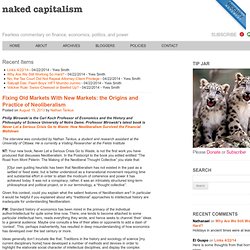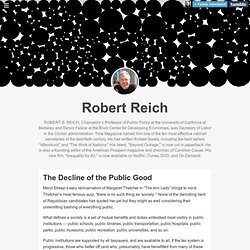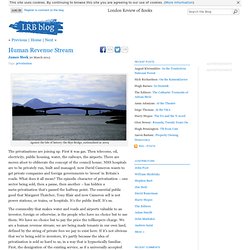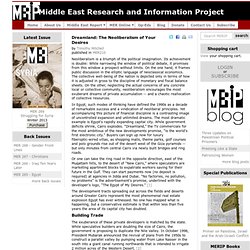

Fixing Old Markets With New Markets: the Origins and Practice of Neoliberalism. Philip Mirowski is the Carl Koch Professor of Economics and the History and Philosophy of Science University of Notre Dame.

Professor Mirowski’s latest book is Never Let a Serious Crisis Go to Waste: How Neoliberalism Survived the Financial Meltdown The interview was conducted by Nathan Tankus, a student and research assistant at the University of Ottawa. He is currently a Visiting Researcher at the Fields Institute NT: Your new book, Never Let a Serious Crisis Go to Waste, is not the first work you have produced that discusses Neoliberalism. In the Postscript to the book you edited entitled “The Road from Mont Pèlerin: The Making of the Neoliberal Thought Collective” you state that: [O]ur own guiding heuristic has been that Neoliberalism has not existed in the past as a settled or fixed state, but is better understood as a transnational movement requiring time and substantial effort in order to attain the modicum of coherence and power it has achieved today.
Tracing the roots of neoliberalism. The strange non-death of neoliberalism... NATO summit highlights neo-con/neo-liberal overlap. San Pedro, CA - As the general election phase of the American presidential election gets underway, the recent NATO summit serves as a potent reminder of just how little difference there ultimately is between the neo-con extremists who dominated US foreign policy under George W Bush, and the neo-liberals who run just about everything in the Obama administration.

Most notably, dozens of Iraq and Afghanistan war veterans returned their medals in a mass action that recalled Operation Dewey Canyon III, in April, 1971, when more than a thousand members of Vietnam Veterans Against the War held five days of marches and demonstrations against the Vietnam War in Washington, DC, including a memorial service near the Tomb of the Unknown and a ceremony on the Capitol steps where more than 800 veterans returned their combat medals. Five Zombie Economic Ideas That Refuse to Die - By John Quiggin. The global financial crisis that began with the collapse of the U.S. subprime mortgage market in 2007 ended by revealing that most of the financial enterprises that had dominated the global economy for decades were speculative ventures that were, if not insolvent, at least not creditworthy.

Much the same can be said of many of the economic ideas that guided policymakers in the decades leading up to the crisis. Economists who based their analysis on these ideas contributed to the mistakes that caused the crisis, failed to predict it or even recognize it when it was happening, and had nothing useful to offer as a policy response. The politics and economics of Austerity. The Trap. Thought maybe » The Trap. The Trap: What Happened to Our Dream of Freedom If one steps back and looks at what freedom actually means for us today, it’s a strange and limited kind of freedom.

The West apparently fought the Cold War for “individual freedom”, yet it is still something our leaders continually promise to give us. Abroad, in Iraq and Afghanistan, the attempt to force “freedom” on to other people has led to bloody mayhem. This, in turn, has helped inspire terrorist attacks in Britain. In response, the government has dismantled long-standing laws that were designed to protect individual freedom… Series. BBC iPlayer - All Watched Over by Machines of Loving Grace: Love and Power. Le néo-libéralisme et l'angle alpha par Frédéric Lordon - une vidéo Actu et Politique.
Neoliberalism - curators... To sort... The Decline of the Public Good) Meryl Streep’s eery reincarnation of Margaret Thatcher in “The Iron Lady” brings to mind Thatcher’s most famous quip, “there is no such thing as ‘society.’”

None of the dwindling herd of Republican candidates has quoted her yet but they might as well considering their unremitting bashing of everything public. What defines a society is a set of mutual benefits and duties embodied most visibly in public institutions — public schools, public libraries, public transportation, public hospitals, public parks, public museums, public recreation, public universities, and so on. Public institutions are supported by all taxpayers, and are available to all. If the tax system is progressive, those who better off (and who, presumably, have benefitted from many of these same public institutions) help pay for everyone else. "Privatiize" means pay-for-it-yourself. Much of the rest of what’s considered “public” has become so shoddy that those who can afford to do so find private alternatives.
Human Revenue Stream. Against the tide of history: the Skye Bridge, nationalised in 2004 The privatisations are joining up.

First it was gas. Then telecoms, oil, electricity, public housing, water, the railways, the airports. There are moves afoot to obliterate the concept of the council house; NHS hospitals are to be privately run, built and managed; now David Cameron wants to get private companies and foreign governments to ‘invest’ in Britain’s roads. What does it all mean? The commodity that makes water and roads and airports valuable to an investor, foreign or otherwise, is the people who have no choice but to use them. And that investment does come, and things get shinier. By packaging British citizens up and selling them, sector by sector, to investors, the government makes it possible to keep traditional taxes low or even cut them. Will there be a revolt? Dreamland: The Neoliberalism of Your Desires.
Neoliberalism is a triumph of the political imagination.

Its achievement is double: While narrowing the window of political debate, it promises from this window a prospect without limits. How Neoliberalism Changed Economic Development: The Examples of India and China.